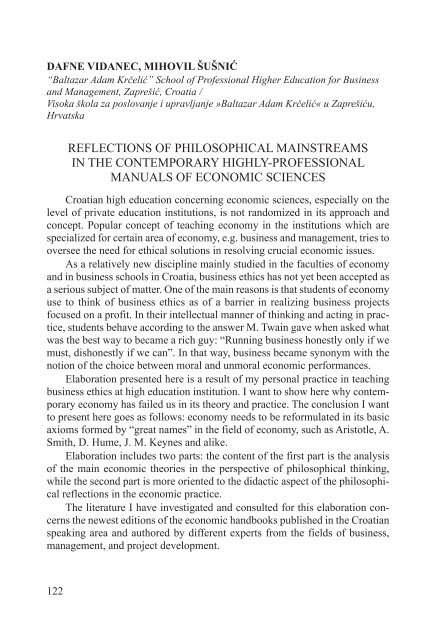Programska knjižica - Hrvatsko filozofsko društvo
Programska knjižica - Hrvatsko filozofsko društvo
Programska knjižica - Hrvatsko filozofsko društvo
Create successful ePaper yourself
Turn your PDF publications into a flip-book with our unique Google optimized e-Paper software.
DAFNE VIDANEC, MIHOVIL ŠUŠNIĆ<br />
“Baltazar Adam Krčelić” School of Professional Higher Education for Business<br />
and Management, Zaprešić, Croatia /<br />
Visoka škola za poslovanje i upravljanje »Baltazar Adam Krčelić« u Zaprešiću,<br />
Hrvatska<br />
REFLECTIONS OF PHILOSOPHICAL MAINSTREAMS<br />
IN THE CONTEMPORARY HIGHLY-PROFESSIONAL<br />
MANUALS OF ECONOMIC SCIENCES<br />
Croatian high education concerning economic sciences, especially on the<br />
level of private education institutions, is not randomized in its approach and<br />
concept. Popular concept of teaching economy in the institutions which are<br />
specialized for certain area of economy, e.g. business and management, tries to<br />
oversee the need for ethical solutions in resolving crucial economic issues.<br />
As a relatively new discipline mainly studied in the faculties of economy<br />
and in business schools in Croatia, business ethics has not yet been accepted as<br />
a serious subject of matter. One of the main reasons is that students of economy<br />
use to think of business ethics as of a barrier in realizing business projects<br />
focused on a profit. In their intellectual manner of thinking and acting in practice,<br />
students behave according to the answer M. Twain gave when asked what<br />
was the best way to became a rich guy: “Running business honestly only if we<br />
must, dishonestly if we can”. In that way, business became synonym with the<br />
notion of the choice between moral and unmoral economic performances.<br />
Elaboration presented here is a result of my personal practice in teaching<br />
business ethics at high education institution. I want to show here why contemporary<br />
economy has failed us in its theory and practice. The conclusion I want<br />
to present here goes as follows: economy needs to be reformulated in its basic<br />
axioms formed by “great names” in the field of economy, such as Aristotle, A.<br />
Smith, D. Hume, J. M. Keynes and alike.<br />
Elaboration includes two parts: the content of the first part is the analysis<br />
of the main economic theories in the perspective of philosophical thinking,<br />
while the second part is more oriented to the didactic aspect of the philosophical<br />
reflections in the economic practice.<br />
The literature I have investigated and consulted for this elaboration concerns<br />
the newest editions of the economic handbooks published in the Croatian<br />
speaking area and authored by different experts from the fields of business,<br />
management, and project development.<br />
122

















